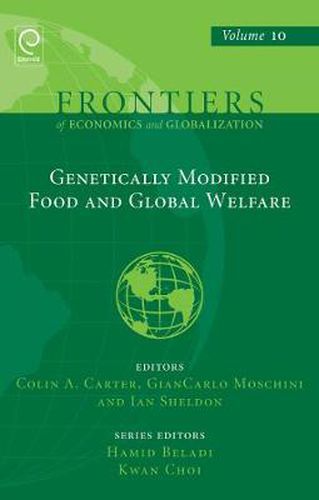Readings Newsletter
Become a Readings Member to make your shopping experience even easier.
Sign in or sign up for free!
You’re not far away from qualifying for FREE standard shipping within Australia
You’ve qualified for FREE standard shipping within Australia
The cart is loading…






Genetically modified (GM) (or transgenic) crops are produced using plant biotechnology to select desirable characteristics in plants and transfer genes from one organism to another. As a result, crops can survive under harsher conditions, costs are lowered, chemical application is reduced, and yields are improved. Scientists are introducing genes into plants that will give them resistance to herbicides, insects, disease, drought and salt in the soil. The application of modern biotechnology to crop and food production is one of the most significant technological advances to impact modern agriculture. The future of GM technology holds further promises of continued benefits. But the potential of GM product innovations has been overshadowed by significant controversy over this technology. The regulatory activism that has accompanied the diffusion of GM technology has given rise to a complex situation that is replete with obstacles for current and future GM innovations. This is particularly true for the European Union (EU), which has implemented restrictive policies that undoubtedly constrain the current status and the future potential of biotechnology. The discourse on biotechnology applied to food and agriculture is at a crossroads due to rising food prices and concerns about adequate food supplies. Over the last decade a large body of applied economics work has addressed the key questions surrounding the application of this technology to food production. It is now time to take stock of the results of these efforts, and consolidate the methodological, analytical and empirical findings. The challenge is to strengthen the consensus of what economics have to offer in the analysis of the complex issues surrounding the ongoing development of GM products for the agricultural and food sector. The task is, to provide a new perspective on the most pressing policy questions and to help foster an intellectual climate conducive to achieving meaningful progress and lasting solutions. That is the motivation for this volume. It brings together fresh insights from top agricultural economists in the areas of consumer attitudes, environmental impacts, policy and regulation, trade, investment, food security, and development.
$9.00 standard shipping within Australia
FREE standard shipping within Australia for orders over $100.00
Express & International shipping calculated at checkout
Genetically modified (GM) (or transgenic) crops are produced using plant biotechnology to select desirable characteristics in plants and transfer genes from one organism to another. As a result, crops can survive under harsher conditions, costs are lowered, chemical application is reduced, and yields are improved. Scientists are introducing genes into plants that will give them resistance to herbicides, insects, disease, drought and salt in the soil. The application of modern biotechnology to crop and food production is one of the most significant technological advances to impact modern agriculture. The future of GM technology holds further promises of continued benefits. But the potential of GM product innovations has been overshadowed by significant controversy over this technology. The regulatory activism that has accompanied the diffusion of GM technology has given rise to a complex situation that is replete with obstacles for current and future GM innovations. This is particularly true for the European Union (EU), which has implemented restrictive policies that undoubtedly constrain the current status and the future potential of biotechnology. The discourse on biotechnology applied to food and agriculture is at a crossroads due to rising food prices and concerns about adequate food supplies. Over the last decade a large body of applied economics work has addressed the key questions surrounding the application of this technology to food production. It is now time to take stock of the results of these efforts, and consolidate the methodological, analytical and empirical findings. The challenge is to strengthen the consensus of what economics have to offer in the analysis of the complex issues surrounding the ongoing development of GM products for the agricultural and food sector. The task is, to provide a new perspective on the most pressing policy questions and to help foster an intellectual climate conducive to achieving meaningful progress and lasting solutions. That is the motivation for this volume. It brings together fresh insights from top agricultural economists in the areas of consumer attitudes, environmental impacts, policy and regulation, trade, investment, food security, and development.